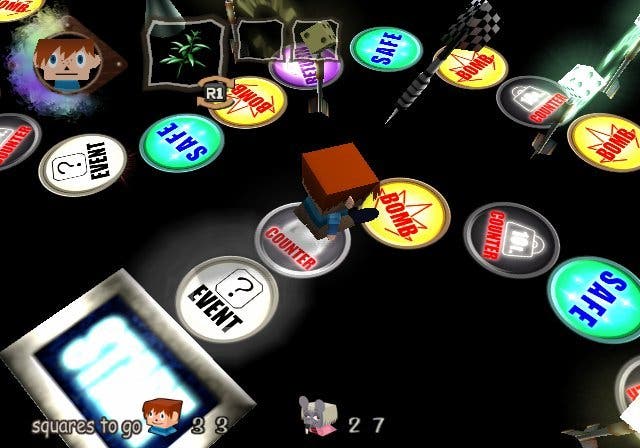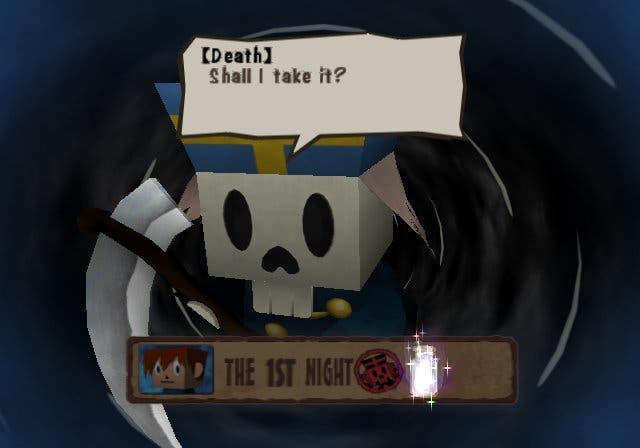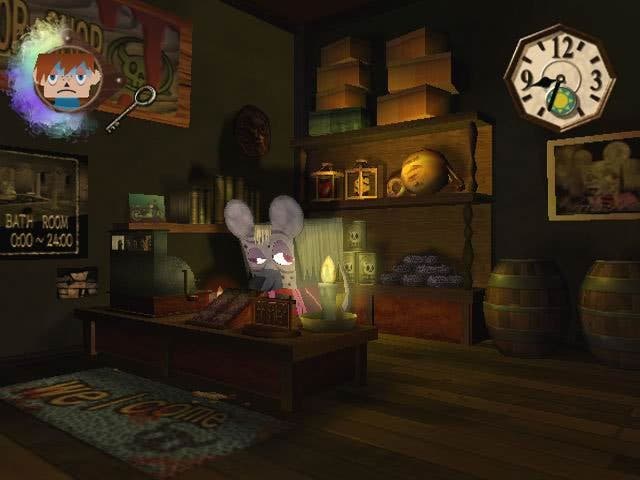Gregory Horror Show
Survival horror gets surreal.
It's equally a pleasure and a chore to review a game that dares to stray from the accepted norms. Capcom instinctively knows Gregory Horror Show is destined to be filed under 'quirky' by unsympathetic retailers already, and has been canny enough to release it at a knock down twenty quid to give it a better chance of a) making it into stores in the first place and b) selling to a confused but intrigued public after something a bit different. But is that enough to coax your moth eaten wallet out into the open air?
Glancing at the screen shots, it's obvious this isn't your standard game; featuring a blockheaded cast of strange individuals based on a Japanese cartoon series (we're sure Rob could give us a thesis on it), it's a halfway house between a survival horror title and the light-hearted puzzle solving/narrative-filled adventures that LucasArts was famed for [you could trace just about anything back to them, couldn't you? -Ed]. Think Grim Fandango gnawing on Racoon City's bones and you're somewhere close.
Soul man

The game revolves around the simple premise that you've wandered into the Gregory House ("a hotel in a chaotic world") and can't get out - trapped by Gregory, an old rat who happens to also be the eccentric manager of the candle lit hostelry. Bizarrely (and bizarre is the byword for the entire game), Death has offered you a way back into the real world by tasking you with retrieving the lost souls that populate the place.
Trouble is, each of these souls is held by one of the deranged hotel guests, who - and some for reasons not fully explained - are keeping these souls for themselves. The game, therefore, involves wrenching these back from these weirdos and delivering them back to the Grim Reaper one by one. But in true Capcom adventure style, that's never as easy as it initially appears.
Presented in a familiar third person 'action-adventure' style, the game borrows plenty of gameplay mechanics from the Resident Evil series, and on that basis could be considered a surreal survival horror offspring. Much like any other game in that sub-genre, the idea is to wander around collecting seemingly unconnected objects, book fragments, health promoting herbs, and - most crucially - spy on the oddball occupants as much as possible; while they're going about their business, when they're sleeping, or when they're just having a little think to themselves. We need to find out what makes them tick, their weaknesses, their thoughts on the other guests and ultimately how to get the souls off them.
Gregory's girl

The first two 'souls' you collect are little more than an exercise in introducing the simple mechanics of being observant, scouring the rooms for clues and putting a plan into action. Most of the game's information comes from basically spying on what everyone's up to by hitting triangle and peeping through keyholes to listen in on their 'thoughts' or their random mutterings. Each entry is logged into your personal memo, then it's up to you to piece together the clues to work out how to wrest the ill-gotten soul away from them. Sometimes you can simply talk to the guest direct to find out what they want; for example Neko Zombie, the hungry undead cat with the stitched-up mouth is desperate for some food, while others, such as the vindictive Nurse Catherine, have no intention of letting go of their soul and need upsetting in some way to get it back.
While GHS shares its basic mechanics and control system with other survival horror titles, that's more or less where the similarities end, with the emphasis firmly on puzzle solving rather than shooting monsters. But despite the lack of hand-to-hand action, you still have an energy bar of sorts - in this case a Mental Gauge which constantly ticks down - and it's your prime concern to stop this from being eroded to nothing. Naturally, in a hotel full of freaks that's no easy task, especially when most of the occupants are intent on chasing after you. Should they catch up with you - or should you inadvertently run into them, the game cuts to a brief 'Horror Show' and a big chunk of your mental energy is lost in the process. Reading books, eating and drinking stave off the progressive ailments of being subjected to the constant madness, but if you're not careful the onset of Tiredness, Headaches, Nervousness, Confusion, Melancholy and Darkness ailments can dramatically impair your general performance. Not only does your facial expression change, but the ability to see deteriorates, and the misery piles up. Deliver a soul, though, and all known ills magically disappear, but if your mental gauge ebbs down to zero, there's no escape and it's Game Over. Time to reload at the fortune telling frog, ribbit.
For all the quirky gameplay, the visuals add an even more unhinged air to the proceedings. For some inexplicable reason, everyone in the Gregory house has a massively disproportionate square head, bemused expression and tiny legs, in case you hadn't quite noticed yet. Assuming it's something to do with the deranged mind of the cartoon illustrators, we'll instead appreciate the fact that it's something different and revel in its eccentricities. In the context of the game, it works very well indeed, and despite their basic appearance, deliberate lack of texturing and limited animation, it's a joy moving through the game just to find out who you're going to encounter next.
Hark! Is that a decent voiceover cast I hear?

Part of the cast's effortless charm is their sheer comical nature, but arguably it's the voiceovers that do the trick (yes, that's right, a Capcom game with excellent voiceovers, whatever next?). Check out the purring maniacal tones of Neko Zombie, screeching for food and vowing revenge, or the wicked giggle of James, Gregory's incessantly plotting son. It's the first cartoon adventure since Grim Fandango where you get most of the fun just listening to what the motley crew have to say next.
It's a shame, then, that Capcom doesn't quite manage to do as much justice to the puzzles, which after the first few get quite petty in their structure. With 20/20 hindsight, they're all logical, but many rely on your ability to retain obscure pieces of information, otherwise you can literally find yourself wandering around in circles for hours before you make progress. It's this crushing sense of rigid linearity that takes away a lot of the potential fun within GHS, and the puzzles that simply require you to be in the right place at the right time are just mean. There are always clues to be had, admittedly, but each puzzle is very different to the next, so you can easily find yourself barking up the wrong tree if your mind's not on the same lateral path as the game designers.
Another obstacle is the fact that while you're busy playing Sherlock, the game constantly delights in tripping you up with its little Horror Shows. The first few times Nurse Catherine takes a blood sample are amusing, but by the latter part of the game you're just fed up with having to run all over the place to escape these fiends. Just as you're about to glean a vital clue with some sleuthy spying, one of the inmates will appear out of their room and dash after you. It's tiring, taxing and drains your will to continue. In the end we called our friendly PR guru for a walkthrough simply so we could actually see what the rest of the game had to offer - the first time we've ever resorted to this disgraceful tactic.
Spoil the broth
Strictly in terms of its puzzles, GHS will appeal to all of those that enjoy adventures, and that's everything from Silent Hill to Monkey Island. Admittedly they're often petty in their exacting nature, but like all the best adventures you'll always feel that warm sense of satisfaction once you've cracked them (if you have the patience required to work through them). But such is the quality of the humour and characterisation, this is one of the few games you can get away with 'cheating' at with walkthrough and still enjoy it. Take away the frustration factor, and it's a far more compelling game for it. We just wish Capcom had perhaps taken a leaf out of Konami's Silent Hill book, and offered a variety of combat and puzzle skill levels, so that it would be possible to avoid resorting to this. Personally we could've done without being chased for 50 per cent of the game; it's tricky enough as it is.
Although it's peppered with a few fundamental niggles that detract from the overall experience, GHS is without question a charming adventure that will have you beaming at its dementedness. Congratulations to Capcom for spotting the fact that this wouldn't have worked at full price; at twenty quid it's definitely well worth a punt if you have a lateral mind and you're thirsting for something slightly left field. If only every publisher could be so experimental.

